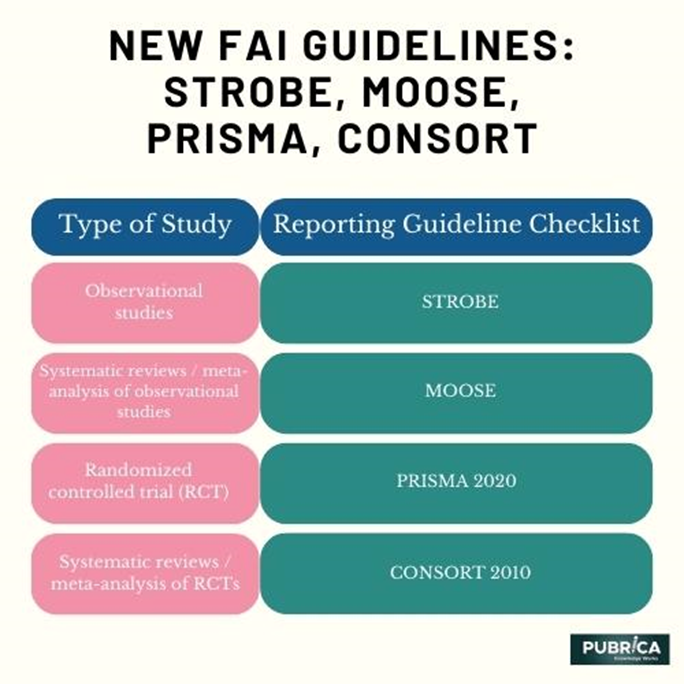New FAI Guidelines: STROBE, MOOSE, PRISMA, CONSORT
Foot & Ankle International's (FAI) purpose is to deliver high-quality, clinically relevant information to improve patient care globally.
Introduction
The FAI Guidelines are not widely recognized or established guidelines in the field of research methodology. However, there are several widely accepted and recognized reporting guidelines that researchers commonly use to enhance the transparency and quality of their studies. These guidelines provide specific recommendations on reporting different types of studies, including observational studies, systematic reviews, meta-analyses, and clinical trials. Let's discuss four well-known reporting guidelines: STROBE, MOOSE, PRISMA, and CONSORT.
- STROBE (Strengthening the Reporting of Observational Studies in Epidemiology): STROBE provides guidance on reporting observational studies, such as cohort studies, case-control studies, and cross-sectional studies. It consists of a checklist of 22 items that researchers should address in their reports to ensure transparent and complete reporting of key study components, including study design, participant selection, data collection, variables, statistical methods, and limitations.
- MOOSE (Meta-analysis of Observational Studies in Epidemiology): MOOSE is a guideline specifically designed for conducting and reporting systematic reviews and meta-analyses of observational studies. It provides a comprehensive checklist of 35 items that researchers should address in their reports, including study identification, eligibility criteria, data extraction, assessment of study quality, data synthesis, and publication bias assessment. MOOSE aims to enhance the transparency and validity of meta-analyses based on observational studies.
- PRISMA (Preferred Reporting Items for Systematic Reviews and Meta-Analyses): PRISMA is a widely used guideline for reporting systematic reviews and meta-analyses. It provides a 27-item checklist and a flow diagram to ensure transparent reporting of key components, including study identification, eligibility criteria, data sources, data extraction, study quality assessment, data synthesis, and risk of bias assessment. PRISMA aims to improve the completeness and clarity of systematic reviews and meta-analyses, facilitating their critical appraisal and replication.
- CONSORT (Consolidated Standards of Reporting Trials): CONSORT is a widely recognized guideline for reporting randomized controlled trials (RCTs). It provides a 25-item checklist and a flow diagram that outline essential information to be included in the trial report. CONSORT covers various aspects of RCT reporting, including participant eligibility, randomization procedures, interventions, outcome assessment, sample size calculation, statistical analysis, and adverse events reporting. CONSORT aims to enhance the transparency and quality of RCT reporting, promoting accurate interpretation and replication of trial findings.

Researchers are encouraged to consult these guidelines relevant to their study design and follow their recommendations when reporting their research. Adhering to these guidelines improves the clarity, completeness, and transparency of research reporting, enhancing the credibility and reproducibility of scientific studies. It also facilitates critical appraisal, meta-analyses, and evidence synthesis, ultimately contributing to the advancement of knowledge in various fields of research(1).
Conclusion
Finally, Pubrica systematic reviews believe that using these checklists will assist authors, peer reviewers, and editors, eventually improving the quality of our journal and patient treatment. We highly suggest that anyone going on a fresh study use these checklists before getting started. The discipline of doing so will surely improve the end result and will most likely decrease the total effort needed in conducting and reporting your study's findings.
Give yourself the Medical edge today
Each order includes
- On-time delivery or your money back
- A fully qualified writer in your subject
- In-depth proofreading by our Quality Control Team
- 100% confidentiality, the work is never re-sold or published
- Standard 7-day amendment period
- A paper written to the standard ordered
- A detailed plagiarism report
- A comprehensive quality report

